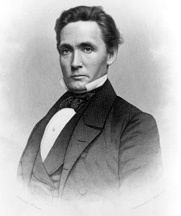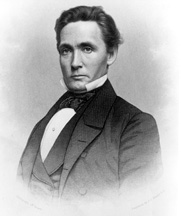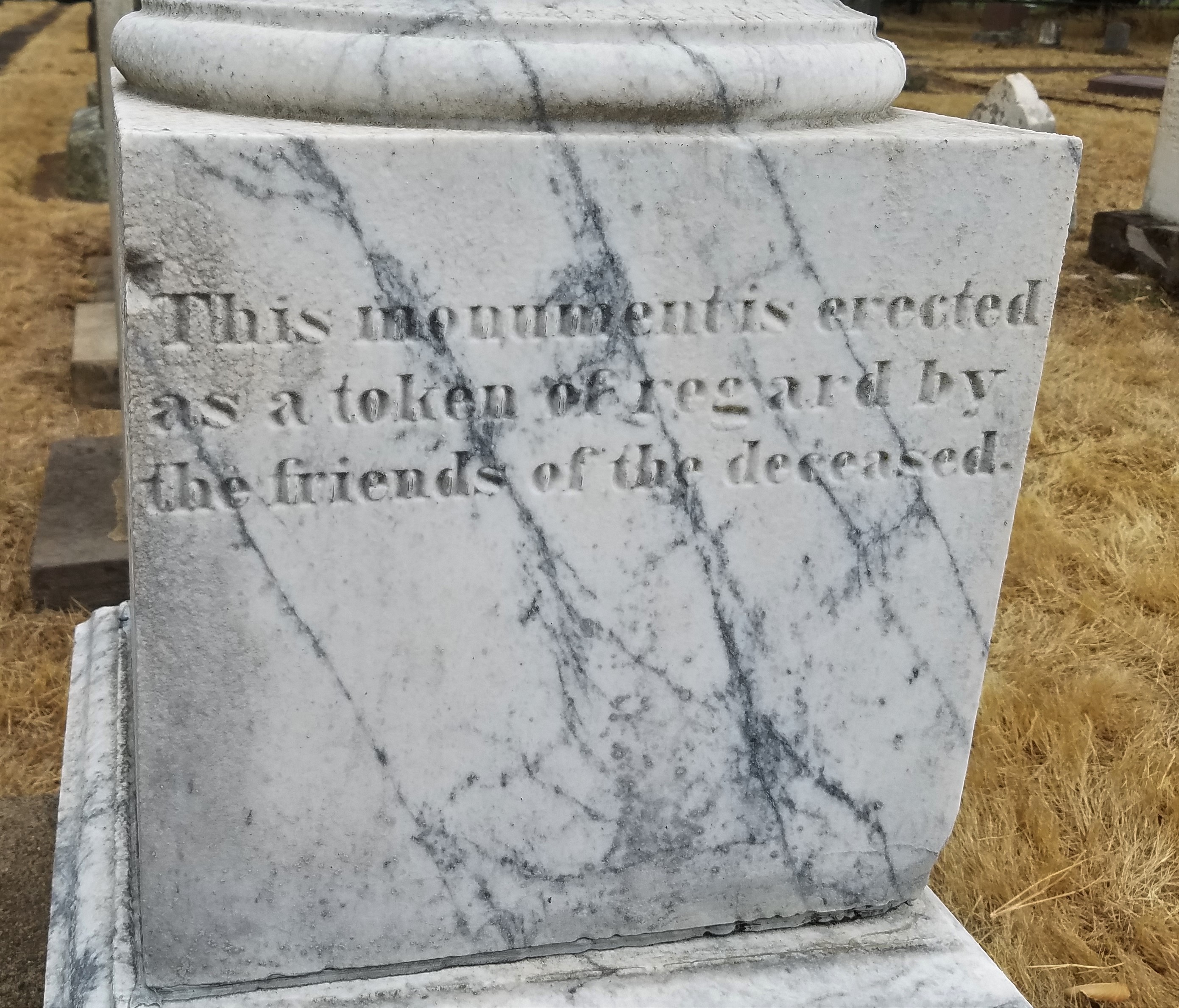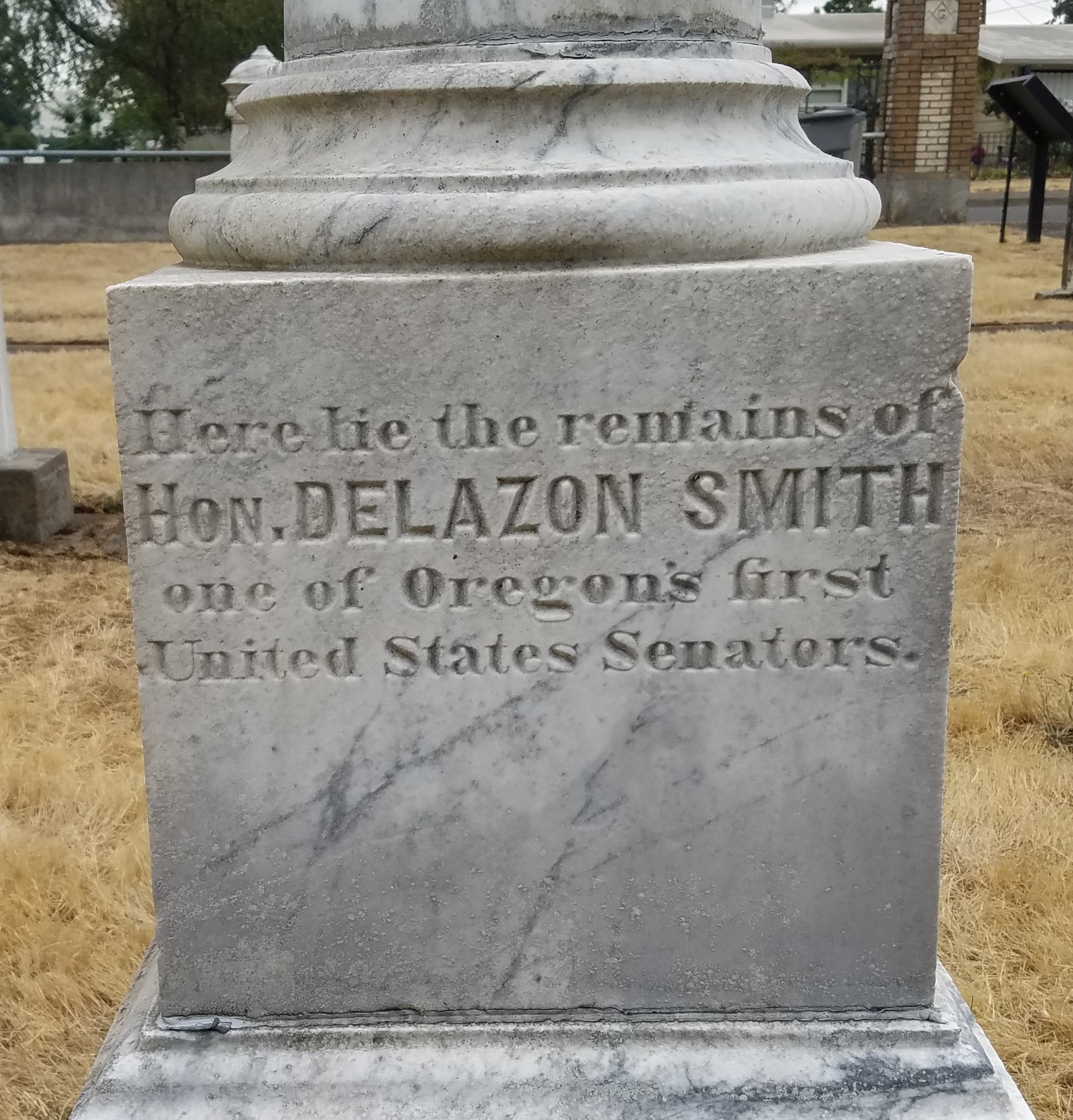US Senator. He served as one of the first United States Senators from Oregon. As a Democrat, he served from February 14, 1859, to March 3, 1859, less than one month and having one of the shortest terms in the Senate. Son of Archibald Smith and Polly Briggs Smith, he had a distinguished ancestry but very little money. In 1831, at the age of 15, he traveled on foot toward the Western frontier, where he stayed for two or three years with an older brother and obtained a rudimentary education. Having heard of a manual labor college in Ohio, he traveled in 1834 to Oberlin, a center of the Abolitionist movement. Smith did not subscribe to anti-slavery sentiments but remained so for two years as a student at Oberlin College. His years at Oberlin were marked by his disagreement with the school's policy and philosophy, and according to some sources, he was expelled, yet his United States Congressional biography states he graduated from Oberlin College in 1837. Relocating to Cleveland, he entered his name as a student in the office of a prominent attorney and was admitted to the bar. After his dismissal from Oberlin College, he published in 1837 an 84-page tract, "Oberlin Unmasked," criticizing the Underground Railroad, as he considered it unlawful, and complained about the suffering he received while a student. A second much-longer title for the tract is "A history of Oberlin : or New lights of the West. Embracing the conduct and character of the officers and students of the institution, together with the colonists, from the founding of the institution," this literary document has been archived at the Library of Congress. At this point, he began a journalism career, establishing in 1838 the "New York Watchman" in Rochester, of which he was an editor for two years; he published and edited the "True Jeffersonian" and the "Western Herald" in Rochester in 1840; in 1841 founded the "Western Empire" in Dayton, Ohio and eventually by 1852 was the editor of the "Oregon Democrat." His interest in politics started with his journalism career, and he was an unsuccessful candidate in local elections. For his support, President John Tyler appointed him Special Commissioner of the United States to the Republic of Ecuador with the task of negotiating U.S. debt claims against the Ecuadorian government. After traveling back east to Virginia, a long eighty-day cruise by ship to Lima, and then traveling north hundreds of miles over undeveloped land to Ecuador, he learned the government was unstable while in the midst of a civil war, and his task could not be resolved until Ecuador had stable leadership. Since he lost contact with the United States for eleven months while in the remote location, his position was criticized as "Tyler's Lost Commission." He served in this position from 1842 to 1845, spending most of his time traveling to and from Ecuador. After his return and settling in Iowa, his wife of nine years, Eliza Voke, died in 1847. Full of grief, he became a Methodist minister for only a short time, as his main interest was law and politics. The couple had only one son to survive to adulthood. In 1848, he married Mary Shepherd, with whom he would have five children. By 1852, he had traveled to Oregon, claiming land in Linn County. In 1854, he was elected to the Territorial House of Representatives, serving as Speaker of the House from 1855 to 1856. Upon Oregon's admission to the Union as the 33rd state, he was elected as one of the two first Senators from the new state. After becoming seriously ill during the long trip from Oregon to Washington D.C., he agreed to serve the short term between statehood and the next election, but he was surprisingly not re-elected in a bitter campaign. Days after Abraham Lincoln was elected United States President on November 6, 1860, he died suddenly from an unknown cause. He had been very disappointed in the election results. There have been many speculations of the cause, with one being the malicious act of poisoning. After a 1985 investigation, nothing was firmly proven. During World War II, a Liberty ship built by the Oregon Shipbuilding and Kaiser for the U.S. Maritime Commission was named in honor of him.
US Senator. He served as one of the first United States Senators from Oregon. As a Democrat, he served from February 14, 1859, to March 3, 1859, less than one month and having one of the shortest terms in the Senate. Son of Archibald Smith and Polly Briggs Smith, he had a distinguished ancestry but very little money. In 1831, at the age of 15, he traveled on foot toward the Western frontier, where he stayed for two or three years with an older brother and obtained a rudimentary education. Having heard of a manual labor college in Ohio, he traveled in 1834 to Oberlin, a center of the Abolitionist movement. Smith did not subscribe to anti-slavery sentiments but remained so for two years as a student at Oberlin College. His years at Oberlin were marked by his disagreement with the school's policy and philosophy, and according to some sources, he was expelled, yet his United States Congressional biography states he graduated from Oberlin College in 1837. Relocating to Cleveland, he entered his name as a student in the office of a prominent attorney and was admitted to the bar. After his dismissal from Oberlin College, he published in 1837 an 84-page tract, "Oberlin Unmasked," criticizing the Underground Railroad, as he considered it unlawful, and complained about the suffering he received while a student. A second much-longer title for the tract is "A history of Oberlin : or New lights of the West. Embracing the conduct and character of the officers and students of the institution, together with the colonists, from the founding of the institution," this literary document has been archived at the Library of Congress. At this point, he began a journalism career, establishing in 1838 the "New York Watchman" in Rochester, of which he was an editor for two years; he published and edited the "True Jeffersonian" and the "Western Herald" in Rochester in 1840; in 1841 founded the "Western Empire" in Dayton, Ohio and eventually by 1852 was the editor of the "Oregon Democrat." His interest in politics started with his journalism career, and he was an unsuccessful candidate in local elections. For his support, President John Tyler appointed him Special Commissioner of the United States to the Republic of Ecuador with the task of negotiating U.S. debt claims against the Ecuadorian government. After traveling back east to Virginia, a long eighty-day cruise by ship to Lima, and then traveling north hundreds of miles over undeveloped land to Ecuador, he learned the government was unstable while in the midst of a civil war, and his task could not be resolved until Ecuador had stable leadership. Since he lost contact with the United States for eleven months while in the remote location, his position was criticized as "Tyler's Lost Commission." He served in this position from 1842 to 1845, spending most of his time traveling to and from Ecuador. After his return and settling in Iowa, his wife of nine years, Eliza Voke, died in 1847. Full of grief, he became a Methodist minister for only a short time, as his main interest was law and politics. The couple had only one son to survive to adulthood. In 1848, he married Mary Shepherd, with whom he would have five children. By 1852, he had traveled to Oregon, claiming land in Linn County. In 1854, he was elected to the Territorial House of Representatives, serving as Speaker of the House from 1855 to 1856. Upon Oregon's admission to the Union as the 33rd state, he was elected as one of the two first Senators from the new state. After becoming seriously ill during the long trip from Oregon to Washington D.C., he agreed to serve the short term between statehood and the next election, but he was surprisingly not re-elected in a bitter campaign. Days after Abraham Lincoln was elected United States President on November 6, 1860, he died suddenly from an unknown cause. He had been very disappointed in the election results. There have been many speculations of the cause, with one being the malicious act of poisoning. After a 1985 investigation, nothing was firmly proven. During World War II, a Liberty ship built by the Oregon Shipbuilding and Kaiser for the U.S. Maritime Commission was named in honor of him.
Bio by: Linda Davis
Family Members
Advertisement


















